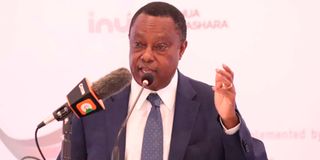Hoteliers unhappy after National Treasury suspends hotel meetings, trainings

National Treasury Principal Secretary Julius Muia. Muia directed all accounting officers in government ministries, departments and agencies to revise their budgets downwards in line with President William Ruto’s directive to shave off Sh300 billion from the current financial year’s budget.
Hotels and resorts that usually host government meetings and trainings are set to suffer following an order by the National Treasury directing that state departments hold such activities in their boardrooms.
On November 1, Treasury Principal Secretary Julius Muia directed all accounting officers in government ministries, departments and agencies (MDAs) to revise their budgets downwards in line with President William Ruto’s directive to shave off Sh300 billion from the current financial year’s budget.
“It has become inevitable to cut down on some activities and effect control measures to manage expenditures,” read a notice from the PS directing state departments to apply the austerity measures, including limitation of requisition for lunches and suspension of approvals for new trainings.
Kakamega County Hoteliers Association chairman William Owuya said the austerity measures will hurt the hotel industry which relies on hosting national and county government events.
Mr Owuya argued that the order by the PS would affect investments and contravene President Ruto’s call for the promotion of small and micro enterprises.
“How do you ban meetings, trainings and lunch from being taken from hotels and expect the economy to grow?” Mr Owuya asked.
In the memo, the Treasury has also directed the suspension of the purchase of computers and ICT materials and froze workshops and retreats except in exceptional circumstances.
“All directorates, departments and units are therefore requested to comply to ensure no commitments are made without supporting funding in line with the PFM Act and its regulations. For the approval of any activity including those supported under donor framework, there has to be a demonstration of sufficient funding under the appropriate budget head,” read the memo.
The move is aimed at controlling the spending on public service and relieving the country from the burden of public debt.
President Ruto promised to bring down the recurrent expenditure further next year in a bid to achieve a recurrent budget surplus by the third year of his leadership.
Recurrent expenditure includes salaries for civil servants, pensions, and payments for operations and maintenance within MDAs.





